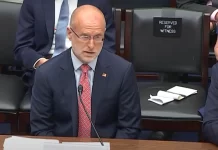By Bob Barr
From dialysis to chickens, the U.S. Department of Justice and its regulatory compatriot, the Federal Trade Commission, are flexing Uncle Sam’s antitrust muscles, notwithstanding strong headwinds from skeptical judges and juries. As the United States Chamber of Commerce recently warned in a brief filed with the courts, “Allowing [DOJ] to retroactively criminalize behavior strikes at the heart of the ordered liberty guaranteed to all Americans.”
The work of the Justice Department’s Antitrust Division receives far less public attention than its bigger brother, the Criminal Division, and the 93 U.S. attorneys who prosecute the vast majority of cases brought each year against individual and corporate defendants. Still, the broad reach of modern federal antitrust laws, dating to the early 20th century (the Sherman Antitrust Act in 1909 and the Clayton Act five years later), can strike fear into the hearts of major corporations and their executives, who can be targeted for either civil or criminal prosecution, with hefty fines possible in either context.
While far smaller, the FTC can employ its regulatory reach in tandem with the Antitrust Division to boost policy initiatives favored by an administration intent on punishing the business sector. In this regard, the Biden administration has been particularly aggressive. Fortunately for the free market, the results of this push have been less than impressive. However, recent actions by both the FTC and the Antitrust Division clearly signal this administration’s intent to continue using both its civil and criminal powers to attack the business sector.
In a highly unusual if not unprecedented move, the head of the Antitrust Division, Jonathan Kanter, declared that its lawyers would try for a third time to convince a jury that two of the country’s largest poultry producers, Pilgrim’s Pride Corp. and Claxton Poultry Farms, conspired to share pricing data in order to unlawfully restrict competition. The trial actually began earlier this month, despite the fact that two prior jury trials of the companies’ executives resulted in mistrials – a strong sign that the government’s case lacked requisite evidence, and a sentiment echoed publicly by one of the second trial’s jurors.
Such back-to-back defeats will almost always convince the feds to drop criminal charges in favor of far more standard civil remedies. But not this Department of Justice.
In a sense, the handwriting on the wall should have been obvious to the Department before starting the third poultry collusion trial on June 6 . In mid-April, a federal jury found DaVita Inc., a major kidney dialysis specialist, and its former CEO innocent of all charges alleging they conspired to restrain trade. The company had simply required its top executive employees to notify the company if they were seeking jobs with the company’s strategic partners – who often weren’t even in the same business sector.
Such non-compete and non-solicit agreements between executive employees and companies in the same fields, known as “non-poaching” agreements, have long been immune from criminal prosecution by the Justice Department, so long as they are reasonably constructed. Interestingly, however, a federal policy to subject such agreements to criminal prosecution appears to have been created out of whole cloth not by legislation or by the courts, but by a Human Resource “guidance” memo issued jointly by the Justice Department and the FTC in October 2016, just prior to that year’s presidential election.
The Department’s decision now to put that policy to the test via criminal prosecution in the DaVita case, and a second similar case, blew up in its face when juries rendered not guilty verdicts in both cases the very same week.
Still, Kanter’s prosecutors persist in pressing the limits of the Department’s powers over what most observers consider normal and acceptable business practices.
The zeal with which this administration intends to continue attacking free market business practices through regulatory edicts is on display also at the FTC.
Although the Commission lacks independent criminal prosecution authority, it has plenary power to issue regulations and to investigate myriad aspects of business practices, including perhaps most notably mergers and acquisitions. It can itself bring costly civil processes against offending businesses and executives, and refer cases for criminal prosecution to the Justice Department.
The ideological perspective of the current 3-2 Democrat majority on the FTC can best be understood by considering that one of Commission Chair Lina Khan’s close allies is Barry Lynn, executive director of the George Soros-funded Open Markets Institute.
With this trio – Lisa Khan at the FTC, Jonathan Kanter at the Justice Department, and Barry Lynn at the OMI – leading the administration’s war against corporate America, we had better gird for many more pitched battles over the next 2½ years.
Originally published by RealClearPolictics. Republished with permission.
More great content from Budget & Tax News










